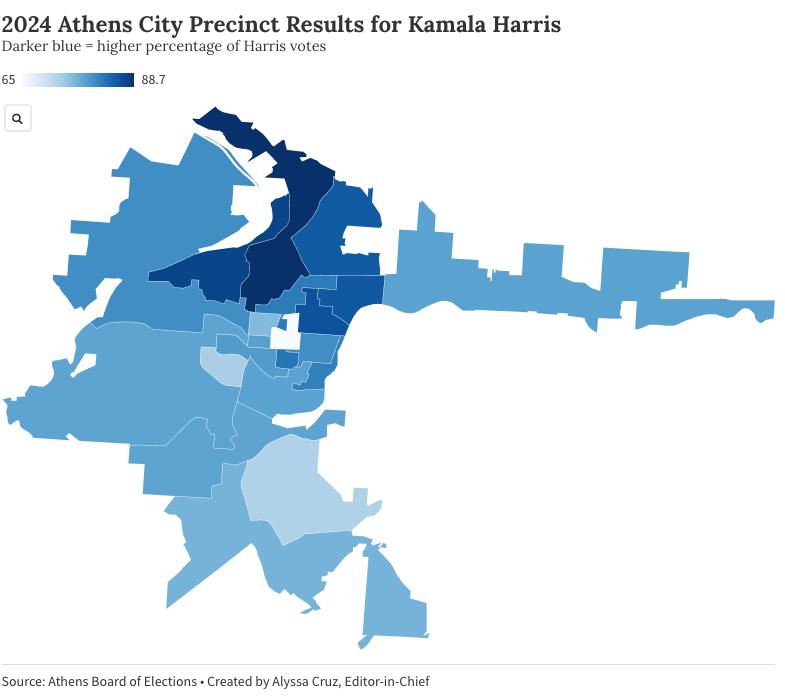




ELIZABETH TALAGA | SLOT EDITOR
Republican candidate Bernie Moreno won the Senate race defeating Ohio’s incumbent Democratic Sen. Sherrod Brown.
As of 11:30 p.m. Tuesday, Moreno won with 50.5% of the votes. Brown received 46.1% of the votes and Libertarian Party candidate Don Kissick received 3.4% of the votes, according to the Associated Press.
In Athens County, Brown was favored and received 13,966 votes out of 24,449 total votes. Moreno received 9,593 votes and Kissick received 865 votes. There were 25 write-in-votes and 25 votes not assigned.
Brown has been in office since 2006 and is a lifelong Ohioan. Brown worked to make the Earned Income Tax Credit permanent and planned to overhaul the tax code to put people first.
Brown served as the Chairman of the Senate Banking, Housing and Urban Affairs Committee and played a prominent role in passing the Wall Street reform law, which established new consumer protection laws.
This election cycle, Brown supported issues such as increasing the federal minimum wage, strengthening policies

protecting discrimination and expanding funding for public schools and healthcare, according to a previous report by The Post.
Moreno was born in Bogota, Colombia. Moreno’s family moved to the U.S. when he was 5 years old, and he became a U.S. citizen when he was 18 years old.
Moreno opened his first car dealership in 2005 and turned the dealership into one of the largest car dealership groups in the U.S. In 2018, he co-founded Champ Titles, which eliminated the need for states to issue paper titles. Moreno has since sold most of his businesses to focus on politics.
Moreno said he would fight to shrink government size and spending to combat inflation. Moreno also supports Israel and said he would fight against selling American businesses and user data to China, according to a previous report by The Post.
Former President Donald Trump endorsed Moreno, according to the AP.
On his website, Moreno said he is running for the U.S. Senate for the men and women who move Ohio forward and American workers who he said have been left behind by career politicians like Brown and President Joe Biden.

Moreno supports a ban on late-term abortions and vows to defend constitutional rights, specifically Second Amend
ment rights. He wants to secure America’s borders and destroy the Mexican Drug Cartels.
Moreno also wants to enact term limits for members of Congress and restore
election integrity. Moreno wants to “end wokeness and cancel culture” in the U.S., according to his website.
As of Tuesday night at 11:30 p.m., neither Brown nor Moreno have commented on the results.
ET029322@OHIO.EDU
ANDERSEN BECK | FOR THE POST
The following vote amounts and percentages are from unofficial results as of 11:04 pm Tuesday.
Incumbent County Commissioner Charlie Adkins resecured his office, beating Independent candidate Jon Rose by 5,897 votes, or 27.2%.
Adkins received 13,783 votes, or 63.6%, while Rose received 7,886 votes, 36.39% of the total votes.
Lifelong Athens resident Charlie Adkins has been county commissioner for 12 years.
In an interview with The Post, Adkins said he secured Athens $12 million in
funding from the American Rescue Project, which he has delegated throughout the county’s townships and villages.
Moving forward, Adkins said he is furthering plans to improve emergency response systems by building a new $12 million 911 call center and improving communication systems for fire departments.
Rose, a former paramedic for Athens County EMS, also supported plans for emergency response issues. His experience with staffing and salary challenges led him to run for the commissioner seat.
Adkins worked for the fire department before his term as commissioner and has
focused his efforts on elderly and low-income residents. He also used a $2 million grant for improvement projects in Jacksonville, Albany and Coolville, according to a previous report by The Post. Adkins and Rose agreed that Athens’ economy could benefit from increased tourism efforts such as supporting the Baileys Trail System, though Adkins said he is wary of how much funding the Baileys need.
“I think one of my most important jobs is the safety of the county residents,” Adkins said.
AB773723@OHIO.EDU
Republican Don Jones has been reelected as state representative of the 95th district, defeating Democratic candidate Micah McCarey.
The 95th district of Ohio consists of Athens, Noble, Morgan, Guernsey, Belmont and Harrison Counties.
According to the Akron Beacon Journal, Jones got 32,348 votes, winning by 35.3%. However, McCarey won in Athens County by 72.12%, receiving 7,328 votes.
Jones will serve his fourth term in the Ohio House of Representatives.
Jones is a former agricultural education teacher and Future Farmers of America adviser at Harrison High School. Since then, he has served as the chairman for the Harrison Soil and Water Conservation District and served on the board of the Harrison County Agricultural Society, the Harrison County Farm Bureau and the Ohio Future Farmers of America Board.
Jones currently serves as the chairman of the South Central Power Foundation Board and is a member of the National Rifle Association.
Within the Ohio House of Repre-
sentatives, Jones has been assigned to the House Finance Committee and the Legislative Service Commission Committee this year.
According to a previous Post article, Jones believes gun violence should be handled by measures such as giving firearms to teachers in schools.
Jones also puts a deeper focus on mental health and opioid addiction within the region. Specifically, Jones co-sponsored House Bill 49, which gives patients their projected medical costs before they commit to recovery programs.
McCarey and Jones agree that the mental health and the opioid crisis in the area come from unemployment and housing instability. However, McCarey favors the expansion of Medicare and Medicaid to aid the issue.
McCarey also stated listening to citizens about the Israel-Hamas war is a key issue, whereas Jones feels that international issues are not the job of state representatives. He instead favors issues going on within the community.
ZW211923@OHIO.EDU

DREW HOFFMASTER | FOR THE POST
The following vote amounts and percentages are from unofficial results as of 8:50 pm Tuesday.
Athens County’s levies 19, 20, 21 and 22, which support medical treatment and emergency vehicles, senior citizen facilities and children’s services, respectively, passed for renewal.
For clarification, a mill is $1 per $1,000 assessed value. An assessed value for a person is any property taxable value a person has.
In addition, the difference between a renewal and a replacement is that a replacement would lead to the value of the millage changing, most likely increasing.
Tax Levy 19 received 23,268 votes, with 12,147 votes supporting the levy, while 11,121 votes were against the levy. Levy 19 passed with 52.20% of the votes in favor and 47.79% against.
The funds from Levy 19 will support tuberculosis treatment, specifically for tuberculosis clinics and testing.
The renewal is estimated to collect $213,000 annually from Athens County taxpayers. The rate at which people will be taxed will never exceed 0.3 mills, meaning for $100,000 of assessed property, a person would pay $4.
The taxes for the renewal will not be collected until 2026. The previous renewal of the levy will be collected for the final time in 2025.
Levy 20 received 23,596 votes, with 16,460 votes in favor of its renewal and 7,136 votes against it. The evy passed with 69.76% of the votes in support and 30.24% against.
Levy 20 will fund emergency medical services in the county, specifically the
maintenance and operation of emergency vehicles.
The levy is estimated to earn $557,000 yearly, beginning in 2025, from Athens County residents. This would be done at a rate not exceeding 0.5 mills, collecting $11 for $100,000 from each person per assessed value.
Levy 21
Levy 21 will provide funding for senior citizen facilities and services, which may be used to support social services, help meet needs and provide housing.
The tax levy passed with 69.19% of the votes in favor and 30.81% against. 23,486 votes were cast for Levy 21, with 16,251 votes in support and 7,235 votes against.
It is estimated Levy 21 will generate $278,000 each year and not tax at a millage above 0.25 mills, meaning that for a $100,000 assessed value, a person would be paying $5.
Levy 21 will begin collection in 2025 for the next five years.
Levy 22
Levy 22, estimated to generate about $2.9 million, will support children’s services and care, helping to prevent children from being abused and neglected. These taxes will also help with children's placement, care and protection.
The levy passed with 15,945 votes in favor and 7,612 votes against; a total of 23,557 ballots were cast on the levy, meaning 67.69% of the votes were supported and 32.31% against.
The millage of the levy is not to exceed three mills, meaning for $100,000 assessed value, a person would pay $60.
The levy will not begin collecting taxes until 2026 and will last 10 years.
@DREWHJOURNALIST
DH384223@OHIO.EDU
BIANCA GRIM | FOR THE POST
The following vote amounts and percentages are from unofficial results as of 8:50 p.m. Tuesday night.
Levy 17 passed with 12,561 votes and 53.99%, supplying funding primarily to benefit public libraries in Athens County.
According to the County Auditor’s worksheet, the levy is estimated to generate $2.175 million annually. Currently at 1.2 mills, the proposed levy will increase
by 0.3 mills for the next five years.
According to Athens County Loves Libraries, a political action committee dedicated to helping pass Levy 17, the replacement levy will cost approximately $3.94 per month for every $100,000 of property value, compared to the current levy that costs property owners approximately $2.45 per month.
Nick Tepe, director of Athens County Public Libraries, said Athens County Public Libraries was fully funded before the budget cuts passed by the state in 2009.
The libraries passed their first tax levy in 2014 to make up for budget cuts. However, Tepe said over the past decade, state funding increased a small amount. “When we passed our last levy in 2019, that was increased to 1.2 mills, and now we’re kind of in the same boat where our costs, as everybodies, continued to go up, but we have not received increased funding from the state,” Tepe said.
Tepe has been working for the Athens system for eight years and sees the library as essential for residents.
“I have always believed in the power of libraries to improve their community, and libraries are at their best when the community is involved and working to help support the library,” Tepe said. “We can respond to the things the community brings us that they need from their library.”
@BIANCAGRIM19 BG748021@OHIO.EDU
DREW HOFFMASTER | FOR THE POST
The following vote amounts and percentages are from unofficial results as of 11:04 pm Tuesday.
Issue 1, which sought to ban politicians and lobbyists from the redistricting process, did not pass in Ohio.
According to the Associated Press’ unofficial results as of 11:03 p.m. Tuesday, 86%, or almost 5 million, of the votes are counted for the issue. Opponents of Issue 1 have cast about 2.68 million votes, or
54.3%, while supporters total 2.25 million votes, or 45.7%.
In Athens County, as of 10:05 p.m. Tuesday, Issue 1 received a large amount of support with 13,522 or 57.94% of the county’s votes. The county received a total of 23,337 ballots cast on Issue 1 with 9,815 or 42.06% of the county’s votes against it.
“Issue 1 explicitly requires Ohio to ban partisan gerrymandering and prohibit the use of redistricting plans that favor one political party and disfavor others,” according to the League of Women Voters
of Ohio’s website.
The proposed amendment was originally proposed by retired Republican Ohio Supreme Court Chief Justice Maureen O’Connor and former democratic Ohio Supreme Court Justice Yvette McGee Brown, according to the LWV.
The LWV said a petition to put the amendment on the ballot was signed by residents in both blue and red counties.
“Ohio is right now one of the 10 most gerrymandered states in America,” according to the Citizens Not Politicians website.
The amendment was supposed to create a 15-member Ohio Citizens Redistricting Commission composed of Democrats, Republicans and independent citizens while banning current or former lobbyists and politicians from the redistricting process.
The LWV said accountability was a goal of Issue 1. The proposed amendment included open meetings for the public’s feedback and a transparent commission selection process.
@DREWHJOURNALIST
DH384223@OHIO.EDU
AVERY ST. GEORGE | FOR THE POST
The following vote amounts and percentages are from unofficial results as of 8:50 pm Tuesday.
Tax Levy 11 passed with 606 votes at 68.01% of the total votes cast.
The tax levy, which will increase funds for the Ames-Bern Fire Department and the Richland Area Fire Department, will affect residents of Canaan Township and Athens City Ward 4, Precinct 1.
The fire departments cover areas north and south of the Hocking River and will
split the taxes collected between the two departments.
The county auditor estimated property owners would pay $35 for every $100,000 of the county auditor’s appraised value. The levy will generate an estimated $85,000 of revenue for the fire departments.
Levy 11 will replace a levy that expired in 2023. The tax will last five years, beginning collection in 2025.

Wayne National Forest Headquarters sign in Nelsonville, Ohio Oct. 25, 2023. (ETHAN HERX | FOR THE POST)

MCKENNA CHRISTY | EQUITY DIRECTOR
Ohio was considered a non-competitive state in the 2024 presidential race as well as in recent elections, according to Decision Desk HQ. From 1964 to 2016, according to the Ohio Capital Journal, Ohio voted for the “winning presidential candidate.” In 2020, the state did not vote for the winner.
The “2024 Ohio U.S. Presidential Results” map reflects 88% of the presidential election results in the state.
Former President Donald Trump won Ohio over Vice President Kamala Harris. The votes were 55.5% for Trump and 43.4% for Harris, according to NBC News. The state contributes 17 Electoral College votes to the presidential race.
Trump won Ohio for the third time on Tuesday. According to WKYC, a Republican has always needed to win Ohio to be elected into office. Meanwhile, only eight Democrats became presidents when losing Ohio, WKYC reports. Although Ohio used to be a swing state, it is growing more loyal to the Republican party in regard to its election outcomes. Ohio was the bellwether state for the longest of any other state in the country, according to NPR.
In the 2020 election, President Joe Biden became the first president to be elected into the White House without winning Ohio since former President John F. Kennedy was elected in 1960, according to the Associated Press. The saying “as Ohio goes, so goes the nation” no longer rings true as the state continues to vote red.
@MCKENNACHRISTY1
MC957019@OHIO.EDU







Kamala Harris won the 2024 Athens City Precinct, sweeping Donald Trump. According to unofficial results from the Athens County Board of Elections, Harris received 5,224 votes in the city, whereas Trump received 985. As of midnight Nov. 6, 56 of 56 precincts were accounted for.
It’s not uncommon for the Democratic Party to win the city. In the last two presidential elections – 2016 and 2020 – the Democratic candidata received the majority of the votes.
In 2020, Joe Biden won the city with 5,795 votes, beating Trump with 1,054; in 2016, Hillary Clinton received 8,145 votes, compared to 2,876 votes for Trump.
Athens County also swings toward the Democratic candidate. Harris received 13,399 votes, compared to Trump’s 10,854; Biden earned 14,772 votes in the county, and Trump received 10,862; Clinton obtained 16,370 votes, and Trump received 11,354.
Although Athens voters typically vote for the Democratic presidential candidate, Ohio has voted red in the last three elections.
According to the AP, Trump received 55.3% of the votes, compared to the 43.8% of votes for Harris. According to CNN, in the 2020 election, Trump won the state with 53.3% compared to 45.2% of votes for Biden.
The Politico reported in 2016 that Trump won with 52.1% versus Clinton, who received 43.5% of votes. @MADALYNTBLAIR MB682120@OHIO.EDU
ABBY JENKINS | HUMAN INTEREST EDITOR
Uptown Athens was filled with locals, anxiously watching television screens in restaurants and bars as Election Day results trickled in. Many cited this cycle as one of the most important elections in history.
Final Athens County results were posted around 10 p.m., but word carried fast about the progress on elections. Some residents expressed a sense of hope and optimism, while others voiced concerns about the country’s future.
Jeff Maiden, an Athens local running for Athens County Engineer, was appalled by the closeness of the national election so far. Maiden has followed elections closely since Jimmy Carter’s election in 1976, and said this is unlike anything he has ever seen.
“I never dreamed it would be in a situation where we would have on one side, a Black woman, who is running for president, who’s very positive about the future, who’s trying to pull everybody together,” Maiden said. “And then we have a former president, who talks about wanting to see reporters shot and all these crazy things.”
Nancy Covington, another Athens local, is from the west side of Athens and worked the Lodi township holding location that morning, assisting many who were coming in to vote.
She believed the language on the ballot was confusing, despite having researched it prior.
“I do strongly react negatively to the ballot language for Issue 1,” Covington said. “I think that was embarrassingly awful.”
Covington received a lot of helpful information from the Athens League of Women Voters and complimented them for a legible voter guide.
As for how locals were feeling about the incoming results, Maiden said despite his concern for the outcome of the votes, he stands behind the system and has a decent level of trust in the voter count during elections.

“I’m from Chillicothe, there’s a VA hospital there, it was due to be closed under Trump Administration cuts but Sherrod Brown worked like hell to keep it open and that’s really important for my family and it’s really important for my community”

Despite this, Maiden is concerned with what politicians and candidates said to persuade their voters.
“I believe the United States (has) the most legitimate, pure, accurate elections on Earth,” he said. “I think some political candidates will say what they know is not true, and believe that … if they say (untrue information) enough, people will believe it.”
Athens resident Charlie Rowe voiced his concerns regarding the state of the election. Contrary to Maiden, he believes this election, no matter how true the results, could determine the future of democracy.
“I’m worried about our democracy,”

“I think we see a growing division between the left and the right, and we are getting more and more extreme on both sides. It’s more important now more than ever.”
Rowe said. “That’s what I worry about. History repeating itself, I think of Germany.”
Covington was disappointed with a lot of the news she had been receiving that evening because she went into election night hopeful. Despite her concerns, she remained smiling among her friends.
“I’m disappointed to hear about Issue 1,” she said. “I’m not terribly surprised about the Supreme Court Justice elections at this point, unfortunately. But has there been stress? Yes, absolutely. I do worry about a lot of drug advisors. There are some people that I know are very inside that I am very frightened by their perspectives.”

“It feels like there’s more at stake this time and it also feels like this is going to be the first time when there’s a winner, but we’re not necessarily done.”
As Athens locals gathered with their loved ones and watched as history was made live on television, there was a combination of stress and hope among residents.
“If you wrote a fictional book about this, people would laugh,” Maiden said. “They’d say, ‘There’s no way this could happen in America. What has happened? What has happened to our country?’ The lowest common denominator is a lot lower than I ever expected.”
@ABBYJENKS18
AJ205621@OHIO.EDU

“My daughter just turned 18 … so we (voted) as a family event … I think it’s very important for you people to get involved in this process because they have to own it”

“Everybody’s gotta vote, if you don’t vote, you don’t have a choice.”
Editor-in-Chief | Alyssa Cruz
Managing Editor | Madalyn Blair
Equity Director | McKenna Christy
EDITORIAL
News Editor | Emily Stokes
Asst. News Editor | Maggie Amacher
Human Interest Editor | Abby Jenkins
Asst. Human Interest Editor | Disha Hoque
Sports Editor | Logan Adams
Sports Editor | Robert Keegan III
Opinion Editor | Megan Diehl
Asst. Opinion Editor | Brianna Tassiello
Entertainment Editor | Trey Barrett
Asst. Entertainment Editor | Sophia Anness
Copy Chief | Jackson McCoy
Slot Editors | Carly DeLuca, Emma Erion, Elizabeth Talaga, Daphne Graeter
ART
Art Director | Mia Pishotti
Asst. Art Director | Nicole Reese
Director of Photography | Alaina Dackermann
Photo Editor | Megan VanVlack
DIGITAL
Director of Web Development | Sadie Borandi
Audience Engagement Editor | Chase Borland
Asst. Audience Engmt. Editor | Abby Waechter
Director of Multimedia | Kendall Timms
Asst. Director of Multimedia | Hailey Dunne
BUSINESS
Media Sales | Ruby Britt, Moira Fudge
Director of Student Media | Andrea Lewis
Have you ever find something in The Post thought-provoking, questionable or even infuriating? Let us know! We are always interested in hearing about the way our readers respond to our content.
Letters should be fewer than 500 words. All letters must be signed by at least one individual; anonymous letters will not be accepted. The Post does not accept letters soliciting donations or news releases. Please include your year and major if you are a student. The Post reserves the right to reject submissions or edit submissions for clarity, vulgarity and Associated Press style.
The Post is an editorially independent media outlet run by Ohio University students. We distribute the paper free of charge in Athens, Ohio, when classes are in session. Editorial page material represents the opinions of the editors, columnists and letter writers. Opinions expressed are independent of Ohio University and our printer.
IN PERSON
Baker Center 325
BY
letters@thepostathens.com
editor@thepostathens.com
ONLINE thepostathens.com/letters
The Post will not print advertising that violates local, state or federal laws. The Post will not run advertisements that violate the Fair Housing Act, or the Equal Employment Opportunity Commission policies. The Post reserves the right to reject advertising deemed to adversely affect the integrity and credibility of the publication or be in conflict with the educational mission of the university or community it serves. The Post retains the right, at its discretion, to approve or reject an advertisement that negatively affects the relationship with our readers or that promotes content, services, or activities that violate our advertising policy. If an error occurs, and an advertisement is published not as ordered, please notify The Post by the end of the business day following publication, a corrected advertisement will run without charge in the next print edition. Cancellation requests for advertising must be received and acknowledged by staff no later than 2:00 pm on Monday for the Tuesday print edition. Refunds will not be given for ads that have been printed. These advertising policy rules can be changed at any time without prior notification.
FRONT DESK HOURS
10 a.m. to 3 p.m.
Monday – Friday
Closed Saturday and Sunday Baker University Center, Room 325
1 Park Place
Athens, OH 45701
SOPHIA ROOKSBERRY| HUMAN INTEREST STAFF WRITER
Late into the evening Nov. 5, Ohio University students gathered across town to witness history in the making. From Baker University Center, located at 1 Park Place, to The Pigskin, located at 38 N. Court St., watch parties of the incoming 2024 election results hosted students and community members of varying political leanings and expectations.
Esme Miranda, a senior studying political science pre-law and women’s, gender and sexuality studies, spent the early hours of the night watching the tally of Ohio’s presidential votes before the state was called in favor of former President Donald Trump at approximately 10:45 p.m., according to AP News.
“I had hope that maybe (Ohio) could have turned blue because I was hoping a bunch of Gen Z people would have voted, and they probably did, but maybe not in the way I would have liked,” Miranda said.
Although Nathan Malz, a freshman studying history, anticipated Ohio would go red, he believed the final result of the presidential election remained unpredictable, even with a majority of states showing support for the Republican candidate after a few hours of ballot-counting.
“It’s going to be really close,” Malz said. “Honestly it’s really kind of a coin flip, I think … I can’t tell if the lead right now could be just a red mirage or if it’s really a lead, it’s really hard to tell but it’s interesting.”
In such a close presidential race, Miranda had to realistically consider a future in which either candidate could take office.
“I’m scared and anxious because it could really impact me as a queer, trans, non-binary person, and with how Trump speaks about trans people and the queer community it just doesn’t look hopeful,” Miranda said.
Additionally, Miranda is concerned with

the way the economy would be affected if the final result favors Trump.
“I feel like he just won’t help the working class at all,” Miranda said.
Malz attended a watch party hosted by The New Political in Baker University Center after following a number of local issues in Lake County, where he’s from, as well as the Senate race between Sherrod Brown and Bernie Moreno.
“I think the president has a lot of power over the Senate, nowadays especially,” he said. “I think if the Senate is red and Trump wins, then Trump will get a lot more done. If the Senate is red and Kamala wins, then she can’t get a lot done.”
Another attendee of the watch party at Baker Center was Gavyn Caney, a junior studying exercise physiology. Caney arrived at the party with min-
imal prior knowledge about electoral issues, demonstrating how the gathering of election results can bring together community members of differing political involvement levels.
“Honestly, I just came down here … for the food and just for hanging out,” Caney said. “I’m not really here as much for the politics.”
As was the case in 2020, results of the presidential election may not arrive until later in the week. Although definitive predictions cannot be made regarding that particular outcome, Malz is sure of one thing.
“It’ll be a show,” he said.
@SOPHIAROOKS_ SR320421@OHIO.EDU
DISHA HOQUE| ASST. HUMAN INTEREST EDITOR
As national election results project across screens in Court Street bars, Athens residents also celebrate the passing of five county tax levies and ballot issues.
Ward 3 Precinct 1 voters affirmed permission for Union Street Market, located at 26 W. Union St., to sell hard liquor Sundays.
A popular spot for Uptown visitors, Athens locals support the store selling hard liquor seven days a week. The permission passed with 93.04% of voters in favor.
Ishmael Young, a junior studying communication and an employee at Union Street Market, predicts hard liquor will be stocked and available Sundays beginning after New Years.
A replacement tax levy and increase regarding Athens County’s library system also passed county-wide.
According to a previous report by The Post, Nick Tepe, the director of Athens
County Libraries, said this money will help upkeep the organization’s provided services.
Locals recognize the importance of a library and its services along with the importance of renewing a levy.
“The library does a lot more than just provide books for people,” Chris Chmiel, an Athens County commissioner, said.
Chmiel is hopeful the passing of the library levy will also go toward supporting its social work program and a new branch developing in neighboring areas.
Kathy Hecht, Athens city auditor, defends the tax increases the levies will bring.
“It’s hard sometimes for people to add to their taxes but services cost money,” Hecht said. “These are all things (locals) want. We want everybody to have access to libraries and Meals on Wheels and tuberculosis (care).”


LAYNE REY | FOR THE POST
In a divisive and long-awaited presidential election, Senate races are not often top-of-mind for voters. However, the serious and widely impactful implications Senate races have on not only the country, but also the states should be considered at the polls. In one key race, Republican candidate Bernie Moreno of Ohio is running against Democratic incumbent Sen. Sherrod Brown. The potential success of either candidate carries high-stakes implications that will affect every Ohioan.
Brown, running for his fourth term in the U.S. Senate, knows Ohio well – and the implications of a fourth Brown term are representative of Ohioans’ wants and needs. His political efforts are focused on “fighting for the dignity of work,” which is a promise he has upheld throughout his time in the Senate.
The American Federation of Labor and Congress of Industrial Organizations represent the largest group of unions in the U.S. It represents more than 12.5 million active and retired workers and awarded Brown a 100% rating in 2023 for his pro-labor and pro-worker policies. A fourth Brown term would mean that working Ohioans will continue to be represented and fought for at

the federal level. Pro-worker policies are at the core of his campaign; simultaneously, he fights to keep fentanyl out of Ohio. Along with feeling the effects of the opioid crisis, Ohioans also want to ensure they have access to reproductive care.
Moreno, a Cleveland businessman, is fighting for restrictions on reproductive care – which directly contradicts the will of Ohioans. In 2023, Ohioans voted on an amendment to the state constitution to protect the right to an abortion and reproductive care. The amendment passed with over 500,000 votes, according to NPR.
Considering the majority of Ohioans value access to abortion, Moreno should have at least approached the issue with sensitivity. Instead, he received bipartisan backlash for undermining older women as single-issue voters on abortion. “It’s a little crazy, by the way — especially for women that are past 50. I’m thinking to myself: I don’t think that’s an issue for you,” he said.
Beyond reproductive care, Moreno’s wealth and desires to reduce regulations for businesses and taxes are typical of the Republican agenda, but will not benefit average Ohioans. This could greatly hinder access to services that Ohioans rely on such as education and infrastructure improvements.
Moreno’s campaign website lists priorities such as ending “wokeness” and “cancel culture” as well as ending socialism in America. Meanwhile, Brown strays away from the political theatrics invading campaigns. Brown’s website focuses on concrete policies he has fought for, his dedication to Ohio and acts of public service.
Beyond the implications this Senate race has on Ohio, it could easily be the race that determines the power balance of the Senate. This would either allow Democrats like Brown to advance a pro-worker agenda or Republicans like Moreno to continue the restriction of reproductive care, among hundreds of other issues that affect Ohioans and the larger country every day.
For the past 17 years, Brown has represented Ohio in the U.S. Senate. As Ohio grows increasingly red, Brown’s policy agenda continues to better represent the will of Ohioans and has far better implications than Moreno’s plans for the state.
Layne Rey is a junior studying journalism at Ohio University. Please note that the views and opinions of the columnist do not reflect those of The Post. What are your thoughts? Let Layne know by tweeting her @laynerey12.
ABBY WAECHTER ASST. AUDIENCE ENGAGEMENT EDITOR
As the 2024 election results are processed, it’s important to remember the official determination of the U.S. president won’t be finalized until December, when the Electoral College casts its votes.
Although the public votes for its preferred candidate on Election Day in November, it is the electors in the Electoral College who formally elect the president and vice president of the U.S. In reality, when constituents vote for president, they are selecting a slate of electors pledged to vote for a specific candidate.
The Electoral College is outlined in Article 2, Section 1 of the U.S. Constitution, which states: “Each State shall appoint, in such Manner as the Legislature thereof may direct, a Number of Electors, equal to the whole Number of Senators and Representatives to which the State may be entitled in the Congress.”
In short, each state is allocated electors based on its total number of Congressional delegates — both senators and representatives. For example, Ohio, with 15 representatives and two senators, has 17 votes in the Electoral College.
In Texas, one Electoral College vote represents 664,000 people, while in Vermont, one vote represents only 210,000. This disparity, known as malapportion-
ment, unevenly distributes political power, giving some regions more influence despite having fewer residents.
Malapportionment undermines the principle of “one person, one vote.” The U.S. Senate, for example, gives every state two senators regardless of population. This gives smaller states disproportionate power, which is magnified in the Electoral College.
Most states use a “winner-takes-all” system, where the candidate who wins the majority of votes in the state receives all of that state’s electoral votes. This system allows candidates to gain the presidency despite losing the popular vote, as was the case in 2000 and 2016 with former presidents George W. Bush and Donald Trump.
Only Maine and Nebraska allocate their electors proportionally, dividing them based on the percentage of the popular vote in each congressional district. This system more accurately reflects the diversity of political views within a state, ensuring voters from different parts of the state have a better chance of having their votes contribute to the final result.
In 2016, about 4 million Californians voted for Donald Trump — more than any other state except Texas and Florida. But because Hillary Clinton won the state, Trump’s supporters had no impact on California’s 55 electoral votes, which all went to Clinton. This is a key example of how the winner-takes-all system can fail to
represent the true political makeup of a state.
The Electoral College was originally established as a compromise during the Constitutional Convention of 1787. The framers feared a direct popular vote for president would give more populous states too much power, diminishing the influence of smaller states.
Over time, the Electoral College has become a fixture of the U.S. election process, reflecting the federal structure of the government, where power is shared between the states and the national government. Although it gives rural and less populated areas a voice in the election, it can also result in a president winning without securing the popular vote — as seen in 2000 and 2016 — raising serious concerns about the fairness of the system.
If the U.S. is truly committed to the principles of democracy, the Electoral College must be redefined to more accurately reflect the will of the people.
A system allowing a candidate to win the presidency without securing the majority of the popular vote contradicts the foundation of representative democracy.
Abby Waechter is a junior studying journalism at Ohio University. Please note that the views and opinions of the columnists do not reflect those of The Post. Have something to say? Email her at aw087421@ohio.edu.
Newsrooms have been incredibly dedicated to informing the public this election season, and they deserve appreciation for that.
POST EDITORIAL STAFF
News publications are the lifeblood of democracy and the lens from which the complexities of the world are examined. Their role is simple, yet far from unimportant; they inform the public and keep powerful entities in check. The presence of news publications in the American political sphere is paramount to cutting through the thick of political rhetoric and extracting the truth from it. In a particularly uncertain and politically charged election, all newsrooms across the country deserve thanks for their constant dedication to democracy. The press provides a crucial public service in reporting factual and unbiased information. This is no easy task, specifically given today’s political climate and the precedence that will be set by the 2024 presidential election. Newsrooms and journalists everywhere deserve gratitude and support for their tireless commitment to their work.
Reliable and accurate information is a necessity at all times, but it becomes particularly crucial during an election season. Journalists face several challenges as they
work toward this goal, including combating the rising amount of misinformation and disinformation.
Even though the public is now more aware of fake news floating around, it has gone beyond social media. In recent years, there has been an increase in AI-generated news websites that spread misleading information, according to the Washington Post. These articles are incredibly convincing, and it is not so easy for readers to discern what is real and what is fake.
There is also the issue of the growing public skepticism toward newspapers and their work. Trust in the media is at an all-time low, forcing newsrooms to prove their credibility and dedication in addition to their everyday duties. The role of the press is not to tell the public how to feel but to provide the public with accurate information it can use so individuals can make up their minds on their own.
Although there have absolutely been instances of bias within the media as political volatility has increased, the press has remained dedicated to the sentiment of objective news. The U.S. is operating within a sensitive
political sphere, and this has made the work of journalists both higher stakes and more important. Despite misinformation, aggression and intimidation from those in power, newsrooms are open, and journalists are committed to seeking and reporting the truth.
Across the country, countless reporters are sitting in newsrooms watching, waiting and writing. Everyone is exhausted and there is a lot of anxiety, but these experiences are why journalists do what they do. Regardless of how this election goes, newsrooms everywhere will maintain their commitment to the duty of informing the people. For this dedication, every newsroom across the country deserves acknowledgment for their work and commitment to the American people and the preservation of democracy.
Editorials represent the majority opinion of The Post’s executive editors: Editor-in-Chief Alyssa Cruz, Managing Editor Madalyn Blair and Equity Director McKenna Christy. Post editorials are independent of the publication’s news coverage. The Post can be reached via editor@ thepostathens.com.